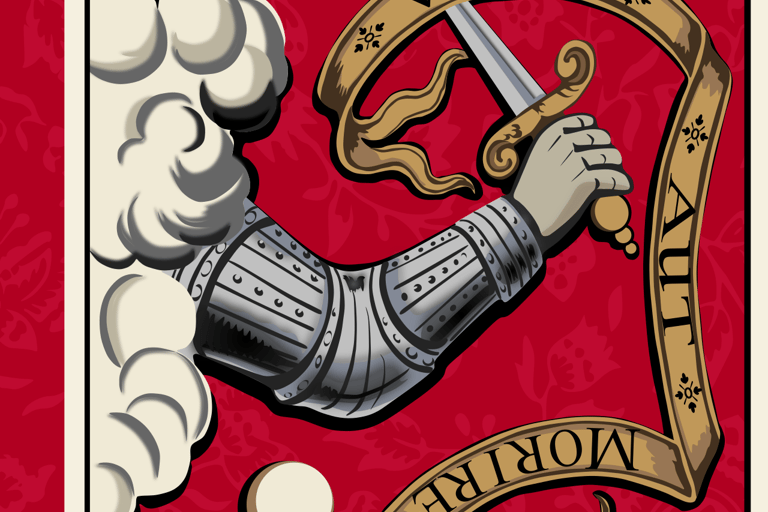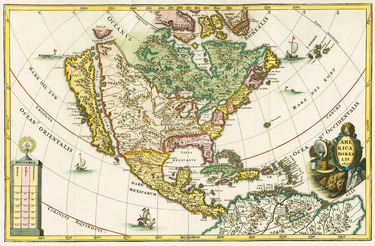History Presentations for 2026: America's 250th Anniversary of Independence
I offer a variety of presentations about the Revolutionary War and the Declaration of Independence. Please consider hosting one not only in late June and July, but also at other times during this momentous year.
Looking for a different topic? Please scroll all the way down for the rest of my US history presentations.
The Cannons of Ticonderoga: A Revolutionary War Story
In early 1776, the scrappy American forces had a British army trapped inside Boston, but no one knew what to do next. A young, inexperienced officer suggested bombing British ships with cannons mounted on the hills. Problem: those cannons were 200 miles away across the mountains, and would have to be transported by sledge, secretly, into Boston. This is is the story of one of the most unlikely and daring escapades of the American Revolution.
The main events featured in this presentation occurred in March, 1776 -- late winter and early spring would be a good time to schedule this.
I can do any talk at any time, of course.
Debating Independence: The American Revolution in 1776
In 1775 most Americans agreed they should remain part of Great Britain; despite turmoil and bloodshed, it seemed impossible that the 13 weak and far-flung colonies could become a nation. But less than a year later, those same people were ready to form a nation, and rejoiced at the signing of the Declaration of Independence. This talk is about exactly how this immense change took place in the hearts and minds of average Americans, how defeat, victory and intrigue all played their roles.
This presentation features events mainly from the first half of 1776. It would be most appropriate to be scheduled between January through July, 2026.
Sustaining the Republic: Advice from the Founders [AVAILABLE AFTER JUNE 20, 2026
America’s founding generation believed that a republic was the best form of government for Americans. But, they warned, republics are more fragile than monarchies. They fall into anarchy or tyranny if certain safeguards are not maintained, and it was up to the citizens to be on guard. What did they think we should guard against? Does their advice hold any wisdom for us today? We must not look at the founders as oracles, and yet they had a solid measure of political wisdom that is beneficial for us to hear.
Risking it all: The Signers of the Declaration of Independence
In 1776, signing the Declaration of Independence was not an act of patriotism. It was an act of treason against Great Britain. Who were these fifty-six men who risked it all to make the strike for independence? Some of their names are familiar, like Benjamin Franklin and John Adams. Others — like Button Gwinnett — are not. There are some good stories of lesser-known Americans in this talk: who they were, what role they played in independence, and what consequences they suffered after they signed the Declaration.


Flag of the Bedford (Mass.) Minutemen, 1775 (public domain)


Rhode Island regimental flag; thanks to Gerry Benoit for this image
Deep Dive into the Declaration of Independence: Just What Does It Say?
What does our most famous document say, and why? What did “all men are created equal” mean to the Revolutionary generation? What were the specific incidents behind that long list of crimes of the King? This talk is about the historical background of a document that we all think we know. I will go through the Declaration closely and show how it is really three declarations, and not just one.
Making the Declaration of Independence: Historical and Philosophical Sources
When Thomas Jefferson, under deadline, took pen in hand to write a declaration of independence, he was not starting with a blank slate of ideas. He drew on many sources for his inspiration and sometimes even for his wording: the long tradition of English rights, political philosophers such as John Locke, and others. This talk is a deep look at the historical sources behind the Declaration of Independence.
The Declaration of Independence Through the Centuries [AVAILABLE AFTER JUNE 20, 2026]
The words seem simple: “all men are created equal,” and endowed with the rights of “life, liberty and the pursuit of happiness.” Yet every era since has grappled with them. Elizabeth Cady Stanton used them as a starting point. Lincoln regarded them as the essential definition of America. Southern secessionists said they were false. Frederick Douglass called them hypocritical. This talk highlights the influence of the Declaration over the last 250 years.
2026 Lecture List
First on this list are “seasonal” talks, which in some way go with the calendar. Following the seasonal talks are “any time” talks.
February: Black History Month
The Problem With Tom: Jefferson and Slavery
The problem with Tom is that no other Founder wrote so much about slavery, or said so confidently that the slaves would one day be free, as Jefferson did – and yet, he himself never freed more than a handful of his own slaves. This talk explores why it was that Jefferson did not “walk the talk,” and explores his stated reasons for not emancipating. This talk is not just about Jefferson; it is also about the young United States, because Jefferson’s choices illustrate the conflicts imbedded in early American society.
February: President’s Day
A Tribute to Abraham Lincoln
This talk is also good for around Memorial Day, which came out of a custom of decorating the graves of the Civil War dead. My thoughts on this talk began with the question: how much does the average person really know about Abraham Lincoln? This talk will take people beyond the log cabin and emancipation, and onto his other qualities: his excellent leadership style, his sly humor, the way he addressed his stormy family life, and more. Lincoln is worth getting to know well, and it seems there is always more to know.
February: Valentine’s Day
John and Abigail Adams: A Love Story
Boy meets girl. Boy becomes a revolutionary and then president. Girl reminds him to not neglect the rights of women. John and Abigail Adams were at the center of the American experiment for decades and devoted themselves to its success, though at great cost to their marriage and family. They were apart for years at a time because of John’s service to the United States. This talk was drawn out of the hundreds of letters that passed between them to tell a very personal story of love, commitment, and devotion to each other and to the United States.
March: Women’s History Month
Jane Addams: Immigration in Chicago
Illinois can be proud of Illinoisan Jane Addams: reformer, philosopher, founder of Hull House, and Nobel Prize winner. This talk traces her unique story: her unhappy years as a young woman, her banding together with friends to move into a Chicago slum, their opening of a “settlement house” there with a primary mission of being a good neighbor -- and on a personal note, why she could be so irritating to her friends.
Founding Mothers: Colonial-Era Moms With Clout
Also goes with Mother’s Day. Our nation’s story is full of moms who influenced history. Yet because they were not the ones holding office or leading battles, their names often slip by us. This talk explores the lives of five of them from our nation’s earliest years, some of whose names most people do not know. They include early feminists, political writers, an entrepreneur and a first lady, all of who challenged their times, enriched their nation, and along the way, raised some pretty great kids.
Founders, Scoundrels, and Visionaries: Colonial Women With Clout
Happy Women’s History Month! Come and meet five women whom you may not have heard of, but who had an outsized impact on our nation’s earliest history. From Margaret Brent, who fended off insurrection in colonial Maryland, to Eliza Pinckney, who expanded South Carolina’s economy, all five challenged their times, enriched our nation, and raised some pretty great kids.
April
April 1865: America in the Crucible
The Civil War was teetering to its final brink, yet victory was not secured. Peace seemed to be arriving on the battlefield – but the North feared that the defeated South might carry on warfare for years through guerrilla efforts. Then a violent attack on the federal government threw all peace prospects into disarray. This was one of the most momentous months in our history, and it is a great story to tell.
June: Juneteenth
From Civil War to Civil Rights: The 13th, 14th and 15th Amendments
This talk is on the ratification progress of the Civil War amendments as well as their impact on American life – an impact that went beyond even the abolition of slavery and the expansion of voting rights. Getting these amendments passed was a great struggle, especially after Lincoln’s assassination, and it showcases (among other things) the guts and commitment of the recently freed slaves. When the Confederate states instituted a sort of “second slavery,” northern Americans had to decide just what the war really had been all about. This talk showcases big dreams, political realities, and ultimately, the enduring power of racism in both the north and the south.
July: Independence Day
See the top of this page!
October:
The Salem Witch Trials and the Power of Fear
I often do this in October, though I’ve given this talk in other months as well. In 1692, a group of teenage girls began having bizarre and disturbing fits and claimed that witches in the community were persecuting them. By the end of the year, twenty women and men had been executed for witchcraft. Though witchcraft trials had happened before in New England, these spiraled out of control; legal safeguards went out the window and fear gained the upper hand. Our images of Salem are often sensational and historically inaccurate. This lecture lays out the true story of one of the strangest and most painful episodes in American history.
November: Thanksgiving and Native American Heritage Month
Puritans, Indians, and the First Thanksgiving
It is now over 400 years since the Pilgrims and Indians feasted together on the rough shores of Plymouth. In the centuries since, misconceptions have arisen about both the Indians and the Puritans, and parts of the story have been obscured. This is a telling of the rich story of the events of 1620 and 1621. The focus is on the political calculations of the Native Americans: why it made sense to them to welcome and aid the English settlers. It has lots of surprises, especially the presence of Native men who had been to England already, who had been kidnapped and had made their way home and were on the scene advising Massasoit on what to do about the newcomers. There were veiled agendas on both sides of the feasting table!
Thanksgiving: Anatomy of a Holiday
(This one is a bit more light-hearted than the above talk.) When did Thanksgiving become a national holiday? 1621? 1863? 1944? The answer is complicated. This talk delves into the long history of thanksgivings before 1621, the confusing connection of the holiday with the Pilgrims, the festival’s changing traditions and, of course, its changing menu. This is a good talk to take in with a pumpkin-spice beverage near at hand -- an enjoyable look at the holiday you thought you knew.
“Any time” talks
Camp Douglas: the Civil War in Chicago
Chicago had an active role in the Civil War, and of those roles was hosting one of the largest prisoner-of-war camps. Thousands of Confederate soldiers suffered and died there. But their stories are not only stories of hardship: they also schemed for their freedom, made complicated and grandiose escapes, and found creative and touching ways to make the hardship and boredom of prisoner life bearable. This talk is a personal look at the lives of the men who were imprisoned there.
Myths in American History: The Fictions We Learned and The Truth Behind Them
All countries tweak their national stories to make the past easier to explain. But the reality is often far more interesting. This talk is enjoyable and ranges from light-hearted myths (was Molly Pitcher a real person?) to more serious ones (did Lincoln own slaves?). I also give some ways to detect the fictions within the truth when it comes to history.
The Cherokee and the Politics of Indian Removal
This talk is on the events leading to the Trail of Tears. In 1828, President Andrew Jackson changed United States' policy toward the Native Americans, and Congress evicted all eastern tribes from their native lands. This talk focuses on the Cherokee experience. They are especially interesting because they had taken on white ways more than any other tribe, yet they were still evicted along with Indians living in more traditional ways. They also put up the best fight, suing for recognition of their nationhood in the Supreme Court. The end of the talk describes “the Trail of Tears” -- the journey to Oklahoma.
Aaron Burr: American Intrigue
Wherever Aaron Burr pops up in our history, there is a good story. He was a scoundrel and a smooth talker, and he seemed to have a knack for talking people out of their money. This talk is about Burr’s attempt to reinvent himself right after the duel. He engaged in intrigue, international double-dealing, and perhaps even insurrection and treason. Or maybe it wasn’t treason; I give Burr’s side of the story as well. This talk illuminates the shifting loyalties on the American frontier in our country’s earliest years and has some real surprises.
“But why a duel?” Hamilton, Burr and Dueling in American History
Probably quite a few of your residents saw the “Hamilton” musical in its two runs downtown. This talk is about the “why” behind the Hamilton-Burr affair. Dueling was part of our national culture for decades. It was a way that members of the ruling class proved that they had the character to be good leaders. This talk will explore the reasons why men in the young United States felt compelled to duel, and, in that context, will tell the tale of the fateful encounter between Hamilton and Burr.
Freedom for the Speech We Hate: A History
Words are powerful, and the United States’ founding generation knew this. Historian Joyce Haworth will trace the convoluted history of freedom of expression in the United States: our Revolution that both widened and narrowed speech, a constitutional amendment that did not quite mean what it said, and a variety of political movements, court cases and sedition laws that brought into focus what American freedom would look like.
The Biggest Little War in America: The War of 1812
The war that brought us Old Hickory, Old Ironsides and Uncle Sam may be the least-understood American conflict. But this three-front war matured the American military, gave the US international security, and vaulted Andrew Jackson from obscurity to national admiration. Commemorating the war’s end, 210 years ago this year, historian Joyce Haworth explains its causes, progress, tragedies and victories.
America Dreamin’: 19th-Century Utopias
I think we have an unfortunate image of the 19th century -- one of starched uprightness. Actually, the early part of that century was pretty crazy and experimental in many ways. One of those ways was in a flowering of utopian communities -- something like the communes of the 1970s. They were scattered across the north and west, from Maine to Illinois. Thousands of men and women left their homes and moved to these remote areas to try out a new and radical way to live, or to find a perfected society. This talk focuses on a few of them, including the "free love" community of Oneida, the experiment of racial equality of Nashoba, and zealous religion of the Shakers.
The First Impeachment: President Johnson’s Battle Against American Rights
The Civil War was over, the Confederacy had surrendered, and America was at last free of slavery. But Andrew Johnson, Lincoln’s former Vice President, opposed the idea of giving rights to the formerly enslaved people. Congress dug in for a battle, the Confederate states instituted a sort of “second slavery,” and northern Americans had to decide what the war had been all about. This is the story of a lock-in, a showdown, and the first impeachment of a president.
